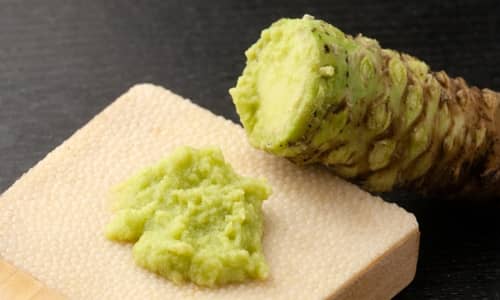Wasabi benefits, side effects
Wasabi Nutrition

| Wasabi (100g) Nutrition | |||
| Carbohydrate | Protein | Fat | Calories |
| 13g | 5g | 0g | 104kcal |
| Main Nutrition | Potassium, Sinigrin | ||
| Main Benefits | Improves dental health and improves heart health | ||
| Side Effects | May irritate the stomach if consumed in excessive amounts | ||
Wasabi is a plant belonging to the mustard family. It has a thick cylindrical stem and its leaves are egg-shaped. The flowers are white and grow well in humid and low temperatures, so they tend to grow near flowing water. It has a spicy and spicy taste, and is often eaten by grinding it and making it into a sauce. Alternatively, it can be made into kimchi and eaten, or it can be used as a medicine applied to painful areas.
2. Wasabi Benefits

1. Oral health
Wasabi acts to remove various germs such as bacteria, and is effective in removing bacteria. This removes various germs and bacteria that can be found in the oral cavity and helps prevent dental problems such as cavities. It is also effective in preventing and eliminating the growth of oral bacteria, which cause damage to teeth. This can help protect and promote overall oral health.
2. Anticancer Effect
Wasabi contains an ingredient called isothiocyanate. This substance is created when glucosinolates are chewed, ground, or digested. It has excellent anti-cancer properties and helps prevent cancer cells from developing. It is also effective in promoting self-destruction of cancer cells and inhibiting their proliferation to other organs, without damaging healthy cells.
3. Digestive health
Consuming Wasabi is also effective in stimulating appetite and aiding digestion. When Wasabi is consumed, the enzyme beta amylase is secreted. This enzyme has the function of stimulating stomach cells and helps promote good digestion. It is also effective in cleansing the digestive system by helping digestive juices to be secreted well. And Wasabi also contains an ingredient called sinigrin. This ingredient has heat-generating properties and helps relieve indigestion.
4. Cardiovascular health
Wasabi has the function of suppressing blood clots and promotes smooth blood circulation. This is effective in purifying the blood. It also helps lower cholesterol levels in the body, making it effective in preventing various cardiovascular diseases. Wasabi also contains potassium. Potassium has the function of excreting sodium and waste products from the blood vessels. It also helps with blood circulation by preventing blood vessels from constricting.
5. Antibacterial and anti-inflammatory action
One of Wasabi’s representative benefits is its antibacterial and anti-inflammatory properties. Wasabi contains a variety of antioxidants. Among them, an ingredient called isothioanate helps eliminate inflammation in the body. And Wasabi has the function of confronting and fighting various germs and bacteria. This is effective in suppressing the growth of various bacteria in the body and treating inflammation caused by bacteria.
3. What is the difference between Wasabi and Japanese Wasabi?
4. Wasabi Side Effect
- If consumed in excess, Wasabi may put a strain on the stomach due to the spicy ingredients in it.
- Wasabi contains toxins that are harmful to the liver. Even in small amounts, excessive consumption over a long period of time may cause liver damage.
- Allergy symptoms may occur depending on your constitution.